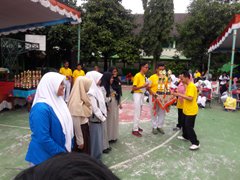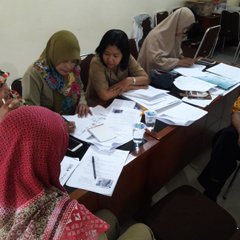Cooperating with Teachers’ Associations with a Singleness of Purpose
The Japan Foundation, Jakarta (Central Java Province/Special Region of Yogyakarta secondary educational institutions)
OKAMOTO Taku
The Central Java Province and the Special Region of Yogyakarta are located in the center of Java Island, and together they are about the same size as Japan’s Kyushu region. Semarang, Central Java’s provincial capital, prospers as the country’s fifth-largest city, while the Special Region of Yogyakarta is well known as a national preservation district where the influence of the former imperial dynasty era remains even today. Japanese-language education is also flourishing in this area. There are around 10 teachers’ associations of various sizes within the province and the region, and they count around 200 Japanese-language teachers as members. A joint teachers’ association covering the province and the region has also been set up, and all the teachers apply themselves diligently day after day, while encouraging each other to improve their Japanese-language ability and teaching skills.
Aiming to Boost Japanese-Language Ability at Study Groups!
Once every one to two months, the various teachers’ associations hold Japanese-language study groups for their teachers, many of whom are aiming to pass the Japanese-Language Proficiency Test (hereinafter “JLPT”). Among long-serving teachers, a large number passed the JLPT under the old system, and since the new system was introduced, they have been striving to study at the new level. The study groups are held by the teachers themselves. The teachers bring along sets of questions to solve amongst themselves. Japanese-Language Specialists listen to the teachers’ needs and draw up training proposals matched to their current levels, and in some cases also serve as instructors at the study groups, for example.
Coming Together – the High School Culture Festival Hosted by the Province/Region’s Joint Teachers’ Association
Of the events hosted by the Central Java Province and Special Region of Yogyakarta’s joint teachers’ association, the largest is the high school culture festival, which is held every year in around January. In 2018 it was held at High School 3 of Boyolali, and the Solo region’s teachers’ association played a central role in preparing and running the event. The culture festival featured a Japanese speech contest, and Shodo (calligraphy), Manga and other contests where high school students from around the province and region showed off the results of their daily study. This Japanese speech contest doubles as a preliminary round for the Jakarta national contest, so there is noticeable enthusiasm amongst the students and teachers alike. The high school culture festival also features culture experience booths, so visitors can enjoy trying on Yukata (Japanese summer kimono), Shodo and Origami (paper craft).

Mr. Yuni (on the right), the head of the joint teachers’ association, presents awards to contest winners at the high school culture festival hosted by the association
Workshop: An Encouragement of Extensive Reading
Last February, the Yogyakarta teachers’ association invited KANAKUBO Noriko of Tsukuba Gakuin University to speak at a workshop (hereinafter “WS”) on “Tadoku reading.” Tadoku reading refers to a method of foreign language learning in which learners begin by reading simple sentences without worrying about vocabulary or grammar, and acquire the language through this repeated, enjoyable input. (According to NPO Tadoku Supporters) For the majority of the teachers who participated in this WS, it was their first experience of Tadoku reading. In the latter half of the WS, participants split up into groups to try their hand at making teaching materials for use with Tadoku reading. When making teaching materials for the elementary level, the vocabulary and grammar that can be used end up being extremely limited. Other devices therefore need to be employed instead, such as including lots of illustrations and photos so learners can carry on reading enjoyably. In the process of creating the teaching materials, the teachers appeared to gain valuable experience in grasping and using the Japanese language from a different-than-usual perspective, while exercising their originality and ingenuity. In the future also, I intend to establish regular opportunities like this for showcasing new learning and teaching methods, in order to support the maintenance and improvement of Japanese-language skills.

Yogyakarta teachers working together to create teaching materials at the Tadoku reading WS
Approaches to Support from Here Forward
Partly because support from Japanese-Language Specialists was introduced into this region around 10 years ago, the teachers’ associations have accumulated expertise already. A teachers’ network is in place, and there is a sense that the associations are beginning to mature as organizations. On the other hand, future challenges can also be identified, including developing human resources to oversee the next generation, and promoting more self-reliance. I want to cooperate with the teachers’ associations while supporting them to resolve these various challenges.
- What We Do Top
- Arts and Cultural Exchange [Culture]
- Japanese-Language Education Overseas [Language]
- Japanese-Language Education Overseas [Language] Top
- Learn Japanese-language
- Teach Japanese-language
- Take Japanese-Language Test
- Know about Japanese-language education abroad
- The Japanese-Language Institute, Urawa
- The Japanese-Language Institute, Kansai
- Japanese-Language Programs for Foreign Specified Skilled Worker Candidates
- Japanese Language Education for Japanese Children Resident Overseas and for the Descendants of Migrants
- Archives
- Japanese Studies and Global Partnerships [Dialogue]
- JF digital collection
- Other Programs / Programs to Commemorate Exchange Year
- Awards and Prizes
- Publications
